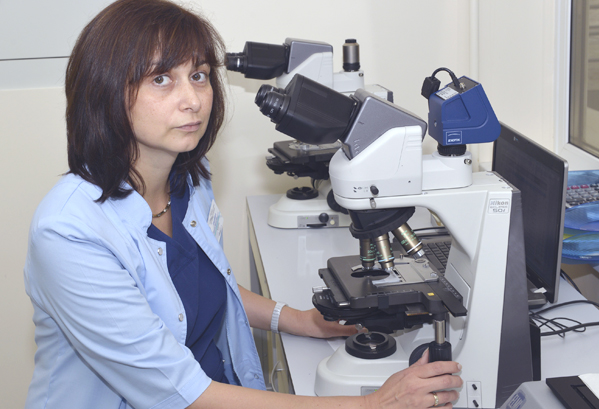FSBI «National Medical
Research Center for Obstetrics, Gynecology
and Perinatology named after Academician V.I.Kulakov»
Ministry of Health of the Russian Federation
1st Gynecological Department (Department of Reproduction)
1st Gynecological Department (Department of Reproduction)
Head of the Department: Aydar Abubakirov, Ph.D.
E-mail: a_abubakirov@oparina4.ru
HISTORY OF THE DEPARTMENT
The Department was established in 1998 at the time of rapid development of a new medical branch.
From 1998 to 2007 the main activity of the Department was the development of an integrated system of diagnosis and treatment aimed at preservation of reproductive health of a couple and functional recovery of fertility in infertile couple. In this period the specialists of the Department had developed a new algorithm allowing to reduce the time of examination of an infertile couple. They also defined the infertility structure, including male infertility, developed categorization, algorithm of infertility diagnostics, pathogenetical approach to therapy of reproductive endocrine dysfunction.
Since 2007 the Department has performed a number of studies, which help to optimize the infertility treatment in women of late reproductive age, in patients with endocrine pathology, and with chronic endometritis. Specialists of the Department have studied the pathogenetic aspects of polycystic ovarian syndrome (PCOS), have optimized the methods of conservative and surgical treatment of infertility in patients with PCOS, depending on the clinical and pathogenetic forms of the disease.

SPECALISTS OF THE DEPARTMENT
The staff of the Department comprises 16 specialists: obstetrician-gynecologists, reproductologists, gynecologists, embryologists.
FOCUS AREA
The Department provides multidisciplinary medical care, using high technology methods in women with reproductive disorders, and infertility conditioned by different causes and pathologies in one or both partners.
The Department offers:
- Preservation of fertility in the frames of long-time birth planning;
- Fertility preservation in the patients with oncological diseases;
- Pregnancy management after the IVF;
- Infertility treatment with the use of ART: ICSI, cultivation of embryos to the blastocyst stage, embryo biopsy at different stages of development, IMSI;
- Vitrification of oocytes, embryos and ovarian tissue;
- Contemporary bank of donor oocytes and donor sperm with the electronic databases and tracking systems;
- Surrogate motherhood programs;
- Male fertility assessment;
- Surgical retrieval, processing and conservation of spermatozoa in severe forms of male infertility;
- Sperm and embryo cryopreservation;
- Embryo reduction in multiple pregnancies (3 or more embryos).
The embryologic laboratory of the Department has modern equipment allowing practically the whole spectrum of manipulations and technologies used in IVF.
This Department was the first in Russia where embryo selection based on the time-lapse monitoring and evaluation was introduced, as well as the methods of pre-implantation, full genomic screening based on comparative genomic hybridization on the chip, allowing selective transfer of one embryo and significant reduction of multiple pregnancies incidence and, consequently, perinatal complications.
The Department is the only one in Russia specializing in prevention and treatment of complications after ART, OHS and multiple gestation. Specialists of the Department use the clear and effective system of preventive and curative interventions in severe forms of OHS, allowing to avoid impairment of health and quality of life to maintain pregnancy.
For the first time in Russia, the methods of safe termination of pregnancy in the 1-st trimester have been tested and applied in the Department. It allows to preserve endometrial function for the future reproduction.
SCIENTIFIC ACTIVITIES
The specialists of the Department actively participate in research, aimed at improvement of medical aid to patients with reproductive disorders. The main aspects of scientific activity of the Department are as follows:
- study of molecular-genetic, immunological and age aspects of infertility;
- search for ways to improve reproductive performance in patients with endometriosis-associated infertility, decreased ovarian reserve, poor response and resistance to stimulation of ovarian function, polycystic ovary syndrome and various forms of amenorrhea;
- development and improvement of methods for oocyte reconstructive surgery in patients with hereditary diseases, inherited and/or acquired mitochondrial dysfunction in oocytes in patients of late reproductive age;
- development and improvement of methods for selection of gametes and embryos based on embryoscopy, full genomic screening of embryos and proteomics;
- studies aimed at improvement and application in clinical practice of non-invasive methods for assessment of endometrial receptivity;
- the studies aimed at optimizing the regimens of ovarian stimulation and luteal phase modulation in IVF / ICSI programs;
- studies of the processes of early folliculogenesis and oogenesis for development and improvement of in vitro maturation and in vitro follicle cultivation, mastering the methods of cell therapy for improvement of effectiveness of infertility treatment in oncologic patients and in patients with follicular depletion;
- clinical and cryobiological studies aimed at efficiency enhancement of cryopreservation of gametes, embryos, ovarian and testicular tissues, development of highly effective regimens and solution of the problem of delayed reproduction in patients with a high risk of the ovarian reserve loss, primarily in patients with oncological diseases





